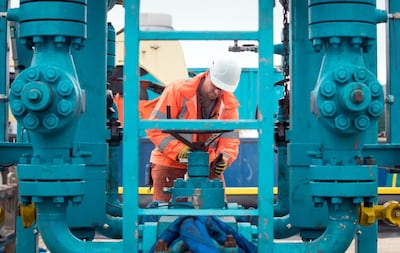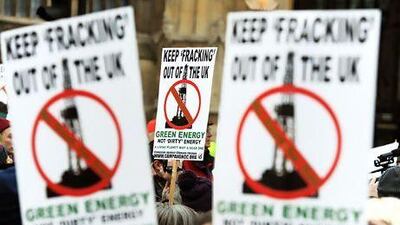Fracking could make a comeback to the UK, said the chief executive of Britain’s Oil and Gas Authority, as Europe faces an energy crisis amid Russia’s invasion of Ukraine
Andy Samuel said at least one company is looking to resume fracking with new techniques that reduce the chances of earthquakes triggered by the process.
His comments came as Prime Minister Boris Johnson faces increasing pressure to reverse the government’s opposition to commercial fracking to allow the UK to exploit its shale gas reserves and reduce the country’s reliance on imports.
While a 2019 ban on existing fracking methods meant sites were filled in with concrete, MPs want the authority to reverse an order to fill in two further fracking wells in Lancashire, the UK, next week — as they could boost Britain’s energy security.
Mr Samuel indicated that the authority has “left the door open to industry”, with the technique potentially returning in the years to come despite concerns from communities over the damage the extraction method can cause.
“One operator is wanting to … progress the science, and try to understand if there is a way it could be done without exceeding the seismic event limits,” Mr Samuel told The Telegraph.
The controversial process of hydraulic fracturing involves liquid being pumped deep underground at high pressure to fracture shale rock and release gas or oil trapped within it.

A moratorium was imposed on fracking in November 2019 after it caused two minor earthquakes in Lancashire, with fierce confrontations between shale gas companies and communities who said the process was dangerous.
The government has not ruled out the prospect of fracking being used in the future as long as tremors can be kept to a minimum.
Mr Samuel said the new techniques being proposed could avoid tremors of above 0.5 on the Richter scale, which is the current limit.
However, the government has insisted that there are currently no plans to lift the fracking moratorium and that any projects could take at least 10 years to set up.
Mr Samuel said the process is “not easy geology to understand”.
“From what we have seen in geology and the bar that needs to be crossed, it will be a long way off,” he said.
MPs have questioned why the UK's limit on the Richter scale for tremors is 0.5, when the US has a limit four times higher.
Meanwhile, a study by the authority found that the tremors had caused “slight non-structural” damage to buildings near a fracking site.
Lee Anderson, MP for Ashfield, described the ban on fracking as “total lunacy” in the light of the Ukraine war.
“At the time of increasing insecurity over fuel supplies, we should be using the huge shale gas resources right under our feet,” he said.
Mr Anderson said fracking can deliver lower fuel prices to the UK, which is already facing a cost-of-living crisis as energy bills spiral.
From April, the energy price cap — the maximum suppliers can charge consumers in a year — will more than double to close to £2,000 ($2,645) for the average household.
But household energy bills could rise even further over the course of the year because prices are now more than 20 times higher than they were two years ago, increasing on Monday from what were already record highs last week.
The price of a therm of gas, the commonly used measure, shot up to about 800 pence during the morning. It had been at around 460 pence on Friday.
Last week, when gas was trading at much lower levels than on Monday, experts predicted the price cap would rise by about £1,000 to more than £2,900 in October when it is next changed.
However, the rise could come sooner if industry regulator Ofgem, the industry regulator, decides the market cannot handle the pressure.
Although Britain imports less than 5 per cent of its gas from Russia, Europe is more exposed — receiving about 40 per cent from the country.
However, Business Secretary Kwasi Kwarteng said at the weekend that a return to fracking would not solve the energy crisis.
“No amount of shale gas from hundreds of wells dotted across rural England would be enough to lower the European price any time soon,” he said. “And … private companies are not going to sell the shale gas they produce to UK consumers below the market price.”


